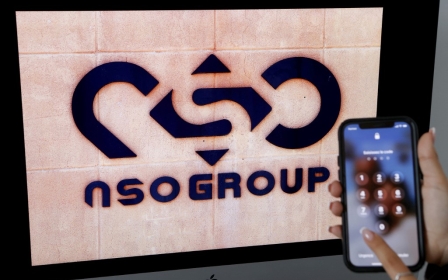Palestinian activist joins UK lawsuit against NSO Group, UAE and Saudi Arabia
A British-Palestinian academic and activist has joined a legal challenge in the UK's High Court against NSO Group, Saudi Arabia and the United Arab Emirates over allegations that NSO's Pegasus spyware was used against him.
Azzam Tamimi was allegedly targeted with the Israeli firm's military-grade spyware by Saudi Arabia on several occasions between 2018 and 2021, his lawyers said on Wednesday.
Tamimi, who was a long-standing friend of Jamal Khashoggi, says his phone was infiltrated while he was in touch with the journalist and Middle East Eye columnist, who was murdered by a Saudi kill team in October 2018.
Khashoggi also appeared on Tamimi's show on the satellite TV channel Al-Hiwar a month before the first verified example of Tamimi's phone being hacked, his lawyers say.
"This deliberate and evil act shows that the regime will stop at nothing to crush free speech and the human rights of those who criticise it," Tamimi said in a statement on Wednesday.
New MEE newsletter: Jerusalem Dispatch
Sign up to get the latest insights and analysis on Israel-Palestine, alongside Turkey Unpacked and other MEE newsletters
"We will bring these matters into the light and believe that justice will prevail in the end."
MEE has sought comments from Saudi Arabia's Ministry of Foreign Affairs and NSO Group.
Legal action follows key ruling
Tamimi joins three other UK-based activists - Yahya Assiri, a Saudi human rights defender, Anas Altikriti, head of the Cordoba Foundation, and Mohammed Kozbar, chairman of Finsbury Park Mosque - in the legal action they began earlier this year.
Their action was given a potential boost in August when the High Court ruled that prominent Saudi Arabian satirist and dissident Ghanem al-Masarir could proceed with his own spyware lawsuit against the kingdom. Masarir alleges that Riyadh installed spyware on his phones and ordered an assault on him.
The judgment in his case was the first ruling in a UK court involving spyware and a foreign country. It will likely set a precedent for future cases involving UK-based individuals allegedly targeted by foreign states on British soil.
Claimants in the legal action brought by the London-based Bindmans law firm and the Global Legal Action Network, now joined by Tamimi, have previously told Middle East Eye of the emotional toll that the alleged infiltrations have had on their lives and the tangible costs to their work.
Altikriti, who works as a hostage negotiator in addition to running the UK-based Cordoba Foundation, said he was in the middle of a negotiation for the release of a young woman when his phones were hacked, allegedly by the UAE.
He told MEE that the negotiation was in its final stages when all communication abruptly stopped. To this day, he doesn't know what happened to the woman or the parties that were trying to free her.
Tamimi has also told MEE that he believes he was targeted in an attempt to spy on the international movement that coalesced to seek justice for Khashoggi after his murder.
"There were communications with the Turks, with human rights lawyers, with activists around the world about what should be done to tell the world that Mohammed bin Salman was actually responsible," Tamimi said. "So they came to monitor what was going on."
Tamimi's lawyers said English courts should recognise that the alleged infiltration of their clients' phones by foreign states should not have happened or be allowed to continue.
"The fact that this spyware has been used by foreign states in the UK is such a serious breach of national security that it should be of major concern to the UK government and security services," said Tayab Ali, a partner at Bindmans.
"Not only should the courts deal with this, but the government should hold a public inquiry to establish exactly how this could have been allowed to happen."
Middle East Eye delivers independent and unrivalled coverage and analysis of the Middle East, North Africa and beyond. To learn more about republishing this content and the associated fees, please fill out this form. More about MEE can be found here.





